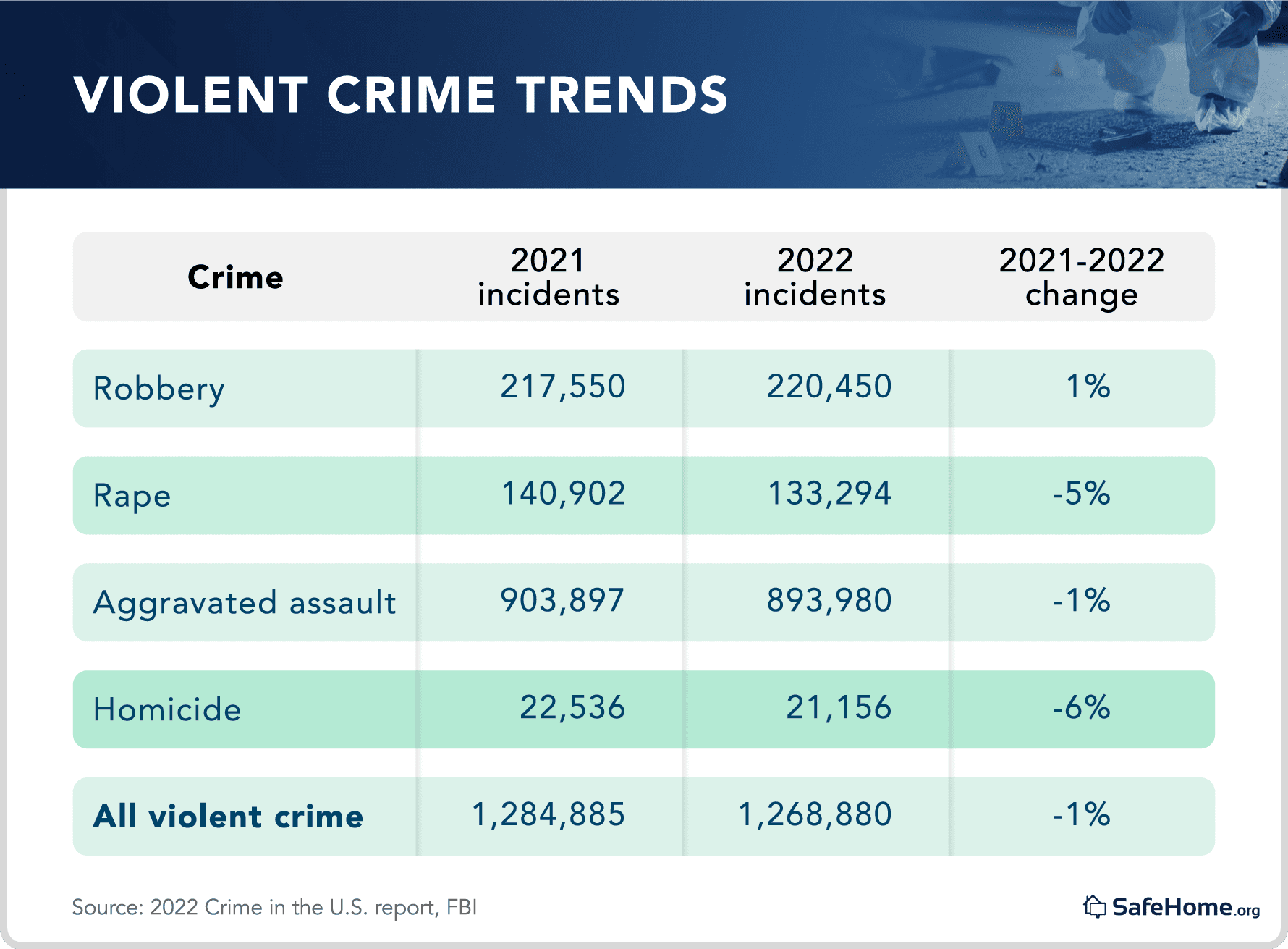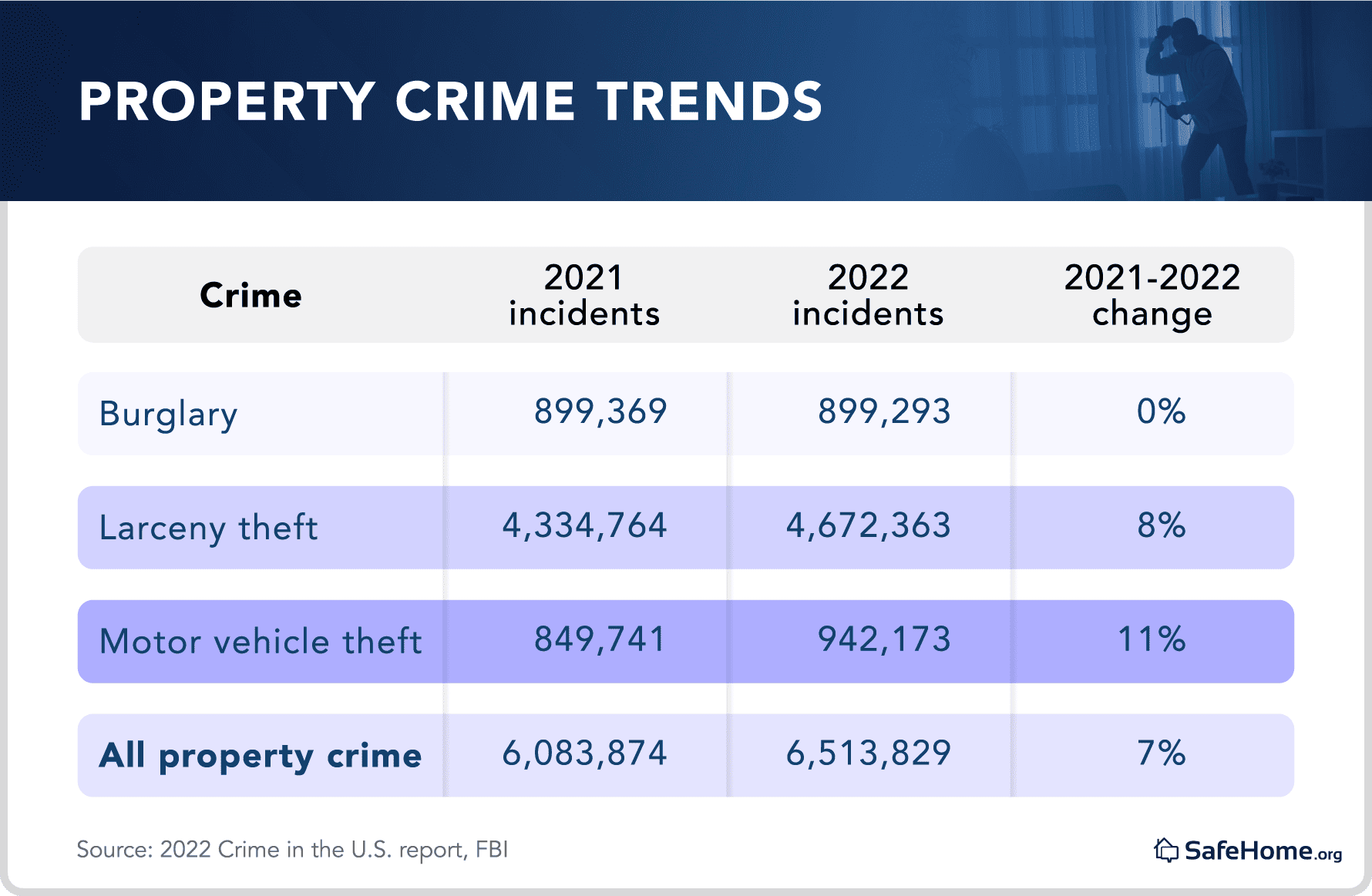2024 Crime Rates in U.S. Cities Report
As a whole, Americans believe crime is getting worse, and the issue is sure to rank among the most important in the 2024 elections. Despite the widespread concern, crime is not equal across the nation.
Each year, SafeHome analysts dig into the latest FBI’s Crime in the United States reports. This year, we determined which cities have particularly high rates of property and violent crimes compared to other cities with similar populations.
Here are some key findings:
- Most violent crimes decreased in the U.S. in the most recent reporting year, but property crimes rose 7% nationwide. Motor vehicle thefts rose most significantly, increasing by 11%.
- Baltimore surpassed Detroit as the deadliest large city in the nation. Among cities with populations of 500,000 or more people, it had the highest per-capita murder and robbery rates.
- Among the largest cities, Seattle and San Francisco had high property crime rates, leading the nation in burglary and larceny, respectively.
- Salt Lake City, Utah ranked first for rape and larceny theft among small-sized cities.
- Cities such as Spokane, Tukwila, Kent, and Tacoma, Washington ranked in the top three for all types of property crimes.
National Violent and Property Crime Trends
Many Americans think crime is getting worse. When it comes to violent crime, the trends are complex. While robberies have increased, other traumatic crimes like rape, murder, and aggravated assault have decreased in the past decade and in more recent years.
Americans’ perception of crime being on an upward trend is certainly true regarding property crime in recent years. Property crime rose by seven percent between 2021 and 2022, and motor vehicle thefts increased by 11 percent in the same period. Larceny, theft without violence or a break-in, increased by eight percent in 2022. Burglary rates mainly remained constant in recent years but have declined significantly since 2012.
Despite nationwide progress toward crime reduction over the past decade, there are many cities where crime is still challenging local leaders and frightening residents. In the next section, we’ll detail the cities with the highest population-adjusted crime rates compared to other cities of like size.
>> Related reading: Best Home Security Systems of 2024
Crime in Large Cities (Populations over 500,000)
Baltimore, which has struggled with high crime rates for decades, had the highest murder rate in the country according to the latest Crime in the U.S. report from the FBI. It surpassed Memphis, which took the unwanted distinction last year. Detroit remained in second place for the second year in a row.
Top 3 large cities with highest violent crime rates (per 100,000 residents)
| Murder | |
|---|---|
| Baltimore, Maryland | 50 |
| Detroit, Michigan | 49 |
| Memphis, Tennessee | 43 |
| Rape | |
|---|---|
| Detroit, Michigan | 114 |
| Columbus, Ohio | 111 |
| Denver, Colorado | 107 |
| Aggravated Assault | |
|---|---|
| Memphis, Tennessee | 1942 |
| Detroit, Michigan | 1642 |
| Kansas City, Missouri | 1155 |
| Robbery | |
|---|---|
| Baltimore, Maryland | 556 |
| Memphis, Tennessee | 372 |
| Philadelphia, Pennsylvania | 370 |
Despite its top ranking, Baltimore has seen its murder rate drop recently. While new public policies and educational initiatives are possible reasons, experts cite “collective fatigue” as a leading cause for the improvement. Residents are fed up with the violence and are making a communal effort to reduce it. Despite the drop in the murder rate, Baltimore was also the top city for robbery.
>> Also check out: The Difference Between Burglary and Robbery
For rape, Columbus entered the top three this year, while Memphis remained the top city for aggravated assault. Aggravated assault is a violent act on another person, usually resulting in physical harm.
Large cities with highest property crime rates (per 100,000 residents)
| Burglary | |
|---|---|
| Seattle, Washington | 1201 |
| Memphis, Tennessee | 964 |
| Albuquerque, New Mexico | 813 |
| Larceny-Theft | |
|---|---|
| San Francisco, California | 4646 |
| Memphis, Tennessee | 4454 |
| Portland, Oregon | 3841 |
| Motor Vehicle Theft | |
|---|---|
| Denver, Colorado | 2155 |
| Memphis, Tennessee | 1748 |
| Portland, Oregon | 1723 |
San Francisco, Portland, and Seattle, three of the largest cities on the West Coast, led the pack regarding property crime. Seattle had the dubious distinction of having the highest burglary rate two years in a row, while San Francisco passed Memphis with the highest larceny rate.
A complex variety of factors drive property crime in these Northwestern metropolises. In the case of Portland, high housing costs and understaffed police agencies contributed to its property crime issues. However, the city recently hired more officers to help reduce crime. Though Seattle led the nation in burglary rates in 2022, the city police agency reported that property crimes declined in 2023 thanks to various new tactics.
>> Related: States with Most Police
Crime in Medium Cities (250,000-499,999 Residents)
Among medium-sized cities in the U.S., with populations of more than 250,000 to less than half a million, New Orleans had the highest murder rate in 2022. More recently, the city’s homicides have dropped off dramatically overall, but murders of children rose to their highest levels in the city in 2023. St. Louis ranked second among medium-sized cities, with the murder rate increasing from 64 to 70 per 100,000 residents in 2022, a nearly 10 percent increase in just one year.
Top 3 medium-sized cities with the highest violent crime rates (per 100,000 residents)
| Murder | |
|---|---|
| New Orleans, Louisiana | 72 |
| St. Louis, Missouri | 70 |
| Cleveland, Ohio | 40 |
| Rape | |
|---|---|
| Anchorage, Alaska | 172 |
| Cleveland, Ohio | 125 |
| New Orleans, Louisiana | 119 |
| Aggravated Assault | |
|---|---|
| St. Louis, Missouri | 1069 |
| Cleveland, Ohio | 1023 |
| Winston-Salem, North Carolina | 1017 |
| Robbery | |
|---|---|
| Oakland, California | 639 |
| Cleveland, Ohio | 426 |
| Minneapolis, Minnesota | 420 |
In 2022, Anchorage became the new leading city in terms of rape rates. Its rate of 172 reported rapes per 100,000 residents is higher than last year's worst city, Cleveland, which had a rate of 117. Though Anchorage is new to the top of the list this year, Alaska has long had above-average rates of sexual violence, especially against indigenous women.
Oakland also outranked last year’s two worst cities for robbery (Cleveland and Minneapolis). Oakland was new to the data set in 2022, making it difficult to say whether this reflects a recent uptick.
Medium cities with highest property crime rates (per 100,000 residents)
| Burglary | |
|---|---|
| Tulsa, Oklahoma | 875 |
| Lubbock, Texas | 856 |
| Cleveland, Ohio | 826 |
| Larceny-Theft | |
|---|---|
| Oakland, California | 4049 |
| St. Louis, Missouri | 3898 |
| Minneapolis, Minnesota | 3201 |
| Motor Vehicle Theft | |
|---|---|
| St. Louis, Missouri | 2550 |
| Oakland, California | 1797 |
| Aurora, Colorado | 1735 |
Property crime has increased more dramatically than violent crime in the 2020s. Oakland and St. Louis are conspicuous among medium cities; both ranked in the top three cities for motor vehicle theft and larceny. Unfortunately, it’s challenging to bring car thieves to justice. In just three months in St. Louis, more than 2,600 cars were stolen, but only 23 people were arrested.
Crime in Small Cities (100,000-249,999 Residents)
This year, a different Alabama city took the dishonor of having the highest murder rate among its small-sized peers. Last year, it was Mobile, at a rate of 46 murders per 100,000 residents, and this year it’s Birmingham. Mobile’s rates fell dramatically after an error in the data was discovered, which also brought down its calculated rape total.
Salt Lake City became the worst small city for rape, and it seems that the issue isn’t limited to just the capital city. Across the state of Utah, rape is the only violent crime in Utah with higher rates than the national average.
Small cities with highest violent crime rates (per 100,000 residents)
| Murder | |
|---|---|
| Birmingham, Alabama | 73 |
| Little Rock, Arkansas | 39 |
| San Bernardino, California | 32 |
| Rape | |
|---|---|
| Salt Lake City, Utah | 189 |
| Pueblo, Colorado | 162 |
| Dayton, Ohio | 148 |
| Aggravated Assault | |
|---|---|
| Little Rock, Arkansas | 1457 |
| Birmingham, Alabama | 1332 |
| Rockford, Illinois | 1194 |
| Robbery | |
|---|---|
| Tacoma, Washington | 341 |
| Pueblo, Colorado | 321 |
| San Bernardino, California | 303 |
Little Rock’s aggravated assault rate decreased year-over-year but it remains first among small cities in the 2022 FBI report. Other types of violent crime, like homicide, peaked in Little Rock in 2022 as well. Birmingham, Alabama was also among the worst cities for aggravated assault. A recent analysis found that Birmingham’s high violent crime rates drove up the cost of crime in the city: researchers estimated that each crime cost the city $11,392 per capita. Rockford, Illinois, the largest city in Illinois outside of Chicago, had the third-highest rate among small cities.
The small cities with the highest robbery rates were all located in the country's Western region, with Tacoma, Washington, Pueblo, Colorado, and San Bernadino, California ranking in the top three.
Small cities with highest property crime rates (per 100,000 residents)
| Burglary | |
|---|---|
| Baton Rouge, Louisiana | 1414 |
| Pueblo, Colorado | 1186 |
| Kent, Washington | 1161 |
| Larceny-Theft | |
|---|---|
| Salt Lake City, Utah | 4910 |
| Tacoma, Washington | 4758 |
| Spokane, Washington | 4178 |
| Motor Vehicle Theft | |
|---|---|
| Tacoma, Washington | 2694 |
| Pueblo, Colorado | 1515 |
| Kent, Washington | 1510 |
Several of the small cities with the highest violent crime rates also ranked highly for property crime. Pueblo, Tacoma, and Salt Lake City had high property crime rates to match their troublesome violent crime statistics.
The state of Washington had two cities in the top three for larceny, topped only by Salt Lake City, Utah. Across the state, Washington is disproportionately impacted by retail theft, a type of larceny. The Forbes Retail Theft Index found that Washington gets 48 percent more reported retail thefts than it should based on its population.
Crime in Towns or Extra Small Cities (10,000-99,999 Residents)
Among very small cities with populations less than 100,000, Uvalde, Texas had the second-highest murder rate in 2022. This was driven by the tragic school shooting that year, whose victims made up almost all of the city’s murders that year.
Extra-small cities with highest violent crime rates (per 100,000 residents)
| Murder | |
|---|---|
| Greenwood, South Carolina | 262 |
| Uvalde, Texas | 143 |
| Forrest City, Arkansas | 94 |
| Rape | |
|---|---|
| Evanston, Wyoming | 261 |
| Juneau, Alaska | 255 |
| Escanaba, Michigan | 234 |
| Aggravated Assault | |
|---|---|
| Monroe, Louisiana | 2432 |
| West Memphis, Arkansas | 2297 |
| Forrest City, Arkansas | 1944 |
| Robbery | |
|---|---|
| Emeryville, California | 618 |
| Commerce, California | 594 |
| Atlantic City, New Jersey | 532 |
Several extra small cities in California and Arkansas appeared at the top of the lists for violent crime rates. In the case of California, violent crime rates are high across the state. Arkansas’ violent crime rates were high, too, but declined slightly in 2022.
Extra-small cities with highest property crime rates (per 100,000 residents)
| Burglary | |
|---|---|
| Beeville, Texas | 3134 |
| Lumberton, North Carolina | 3003 |
| Commerce, California | 2070 |
| Larceny-Theft | |
|---|---|
| Tukwila, Washington | 14330 |
| Emeryville, California | 11697 |
| Lone Tree, Colorado | 9870 |
| Motor Vehicle Theft | |
|---|---|
| Commerce, California | 4208 |
| Tukwila, Washington | 4168 |
| Fife, Washington | 4083 |
Beeville, Texas had the highest burglary rate among very small cities. According to local law enforcement, property crime increased significantly in 2022: the Beeville Police Department received two calls per resident per year. Commerce, California was the top city of its size for motor vehicle theft, and third highest for burglary. Another Washington city, Tukwila, took the top spot for larceny and ranked in the top three for vehicle theft.
Our Data
This project analyzed the FBI’s Crime in the United States (CIUS) estimates from 2022, the latest year available. Particularly, we explored Table 8, Offenses Known to Law Enforcement. The data used in creating this table were from all city and town law enforcement agencies submitting 12 months of complete offense data for 2022.
To calculate the rates of crimes in each state, we divided the number of crimes reported by local law enforcement agencies by the population of the cities represented by those agencies. Then, we multiplied that number by 100,000. Please note that for 2022, limited data were available for Florida, Illinois, Maryland, and Pennsylvania.


